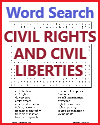Civil rights and civil liberties are two closely related but distinct concepts in the context of the American government, both of which play a significant role in protecting individual freedoms and ensuring equal treatment under the law.
Civil rights refer to the rights that protect individuals from discrimination and unjust treatment based on certain characteristics or attributes. These rights are designed to ensure equal opportunities and equal protection under the law for all citizens. Civil rights are often associated with issues of social justice and equality. Key aspects of civil rights include:
- Protection from Discrimination: Civil rights laws prohibit discrimination on the basis of race, color, national origin, religion, sex, disability, and other characteristics. These laws aim to ensure that individuals are not denied opportunities, services, or benefits because of their identity or background.
- Equal Access: Civil rights encompass the principle of equal access to public facilities, services, and education. This includes ensuring that people of all backgrounds can access housing, employment, education, and public accommodations without facing discrimination.
- Voting Rights: Civil rights include the protection of voting rights to ensure that all eligible citizens have the opportunity to vote and have their voices heard in the democratic process. This also includes efforts to combat voter suppression.
- Affirmative Action: Some civil rights measures in the past have included affirmative action policies that sought to address historical discrimination by promoting equal opportunities for underrepresented groups in areas like education and employment. [Affirmative action was overturned by the United States Supreme Court in Students for Fair Admissions, Inc. v. President and Fellows of Harvard College (2023).]
- Civil Rights Acts: Landmark legislation such as the Civil Rights Act of 1964 and subsequent amendments have played a crucial role in protecting civil rights in the United States. These laws have outlawed discrimination in various aspects of public life.
Civil liberties are individual freedoms and rights that are protected from government infringement. These rights are outlined in the Bill of Rights, the first ten amendments to the U.S. Constitution, as well as in other legal protections. Civil liberties limit the government's power and protect citizens from government intrusion into their personal lives and freedoms. Key aspects of civil liberties include:
- Freedom of Speech: The First Amendment guarantees freedom of speech, allowing individuals to express their opinions, beliefs, and ideas without government censorship or retaliation.
- Freedom of Religion: The First Amendment also protects the freedom of religion, ensuring that individuals can practice their chosen faith or no faith at all without government interference.
- Freedom of the Press: The First Amendment safeguards a free press, allowing journalists to report news and information without government censorship or control.
- Right to Privacy: Although not explicitly mentioned in the Constitution, the right to privacy is considered a fundamental civil liberty. It encompasses personal privacy, protection from unwarranted searches and seizures, and reproductive privacy rights.
- Due Process: The Fifth and Fourteenth Amendments guarantee due process of law, ensuring that individuals are treated fairly by the legal system and have the right to a fair trial.
- Right to Bear Arms: The Second Amendment protects the right of individuals to keep and bear arms, subject to certain regulations and restrictions.
- Protection from Cruel and Unusual Punishment: The Eighth Amendment prohibits cruel and unusual punishment and excessive bail.
- Protection from Self-Incrimination: The Fifth Amendment protects individuals from being compelled to incriminate themselves.
In summary, civil rights focus on protecting individuals from discrimination and ensuring equal treatment, while civil liberties center on safeguarding individual freedoms from government intrusion. Both concepts are essential for upholding the principles of democracy, equality, and individual liberty in the United States.
|







